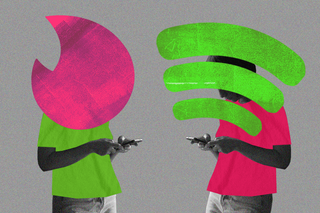
Tinder, Spotify May Be Collecting More Data Than They Tell Us
“They have been largely overlooked, compared to bigger tech companies such as Facebook, Google, Tik Tok etc .who have faced more scrutiny”

Big tech behemoths are now under greater scrutiny than ever, but, according to researchers, it’s not nearly enough. While much of society’s scrutiny and ire has been directed towards Facebook, Twitter, and Google for their role in fuelling democracy-undermining behaviors online, platforms like Tinder and Spotify have been let off the hook, relatively speaking.
The perception is that these platforms don’t mediate our lives as much as the others. A team of researchers from the University of Auckland, however, beg to differ: their study, published in Journal of the Royal Society of New Zealand, aimed to find out how exactly the recommendation-based algorithms powering Tinder and Spotify work. “People might think they’re more benign, but they are still highly influential,” they said in a press release.
“[W]e conducted a sequential analysis of several iterations of Spotify and Tinder’s Privacy Policies and Terms of Use to assess possible implications for how the companies’ recommendation algorithms work,” the paper stated.
“With these powerful digital platforms possessing considerable influence in contemporary society, their users and society at large deserve more clarity as to how recommendation algorithms are functioning,” said Fabio Morreale, co-author from the Aukland School of Music.
Legal documents outlining the two companies’ privacy policies are part of the obfuscatory mechanics involved. “They tend toward the legalistic and vague, inhibiting the ability of outsiders to properly scrutinize the companies’ algorithms and their relationship with users. It makes it difficult for academic researchers and certainly for the average user,” Morreale added.
Much of what the scrutiny reveals may be self-evident, but still important to know in the context of how they may be shaping our own experiences. The research shows that Spotify’s policies allow it to collect much more user-data in the present than in previous years: where previously it was limited to knowing users’ age, gender, location, and other basic information, it now has access their photos, voice and background sound data, and much more. On the face of it, it helps create the much–discussed “mood playlists” that have taken over our soundscapes, but it does more than that too. For instance, it paves way for “emotional surveillance,” as some have called it — with some users’ most intimate moments being mined for profit and used against them.
Related on The Swaddle:
Moreover, Spotify’s new terms state that what it recommends to users may not be based entirely on their user data, but also on commercial, third-party interests. In other words, it collects a massive volume of information to ostensibly fine-tune our playlists according to our tastes, but it could also promote music that may not fit — simply to further their financial interests.
“In their recommendations (and playlists for that matter) Spotify is also likely to be pushing artists from labels that hold Spotify shares — this is anti-competitive, and we should know about it,” say the researchers.
With Tinder, researchers weren’t able to get to the root of how the algorithm works to match people — but this, they say, is the point of the study. We should know how tech influences our relationships, but they make it extraordinarily hard to do so, and “Tinder goes out of its way not to tell us,” says Matt Bartlett from the School of Law.
In 2017, journalist Judith Duportail broke the story of how Tinder collects reams of information about users to chalk up a “desirability score;” in this journalist’s case, her request for her data led to 800 pages of her “deepest, darkest secrets.” But even so, we still don’t know how exactly Tinder uses these 800 pages of data: “Our matching tools are a core part of our technology and intellectual property, and we are ultimately unable to share information about our these proprietary tools,” a spokesperson told Duportail.
“Tinder is often compared to a bar full of singles, but it’s more like a bar full of single people chosen for me while studying my behavior, reading my diary, and with new people constantly selected based on my live reactions,” Duportail noted.
Previous reports scrutinizing dating apps have found every manner of privacy violations — from gathering details about someone’s HIV status, to sharing data with third–party customer agencies, to collecting their web browsing information and social media usage too. “…even if you’re not explicitly sharing certain preferences with an app, these platforms can still amplify potentially problematic dating preferences,” Vox noted.
We may well be in an age of information — but the direction of information flow is vastly skewed in favor of many-to-one thanks to large corporate conglomerates. Being aware of the ways our lives are used against us is the first step toward breaking free.
Rohitha Naraharisetty is a Senior Associate Editor at The Swaddle. She writes about the intersection of gender, caste, social movements, and pop culture. She can be found on Instagram at @rohitha_97 or on Twitter at @romimacaronii.
Related


Soil From the Moon Could Generate Oxygen, Fuel
